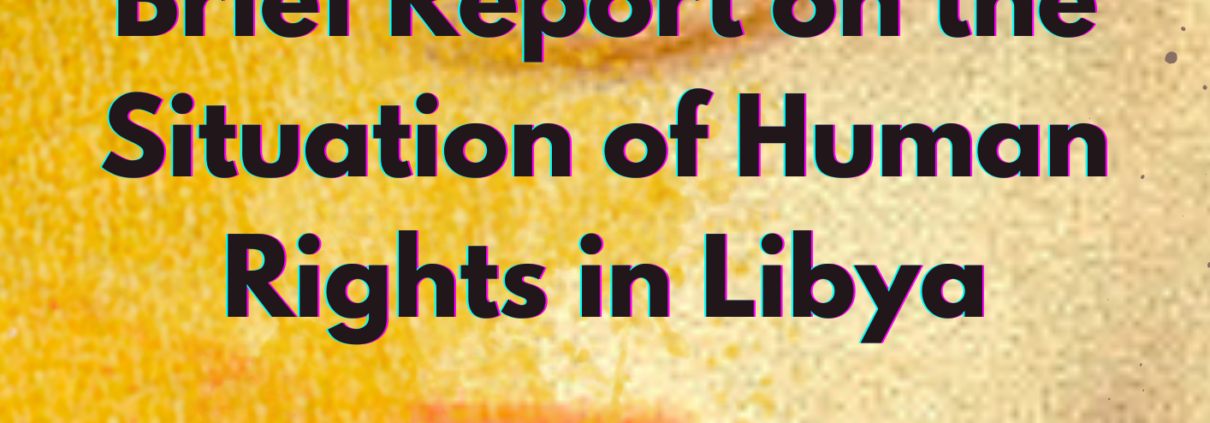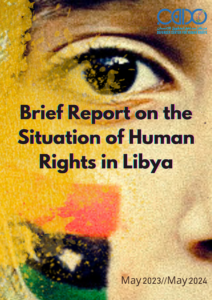Brief Report on the Situation of Human Rights in Libya 2024
Brief Report on the Situation of Human Rights in Libya / Report2024
The international and national failure to address the crisis of widespread human rights violations in Libya has been ongoing for many years. Despite the continued work of the United Nations Mission in Libya, which has been managed by 9 Special Representatives of the Secretary-General of the United Nations, the Mission has not been able to achieve its primary goal, which is to facilitate a comprehensive political process led, owned and conducted by Libyans with the support of the international community, including the holding of free, fair, transparent and inclusive national and parliamentary elections as soon as possible. Also, despite the end of the mandate of the Fact-Finding Mission and the publication of its comprehensive final report documenting the gross violations of human rights in Libya, directing accusations against specific parties and entities; this effort has not been utilized to date. The absence of political will on the part of the international community, which is reflected in the issuance of 44 Security Council resolutions regarding Libya which have been insufficient in resolving the situation, in addition to the inability of internal political parties to find solutions to the crisis, leading to the failure to hold fair and transparent national elections, and transformed Libya into a safe haven for human rights violators in light of the spread of impunity and the absence of accountability.
What is more dangerous than the failure of the international community to assist holding elections in Libya, supporting civil society, and stopping human rights violations, is the Libyan political division and the absence of political will on the part of the government and various Libyan authorities to hold elections that respect and represent the will of Libyan citizens, and to relinquish power and weapons; so that Libya can enjoy peace, security, democracy, and human rights. In addition to this, the increasing influence of extremist religious groups on a significant number of official Libyan institutions across the country has encouraged the spread of their anti-rights and freedoms discourse on the pulpits of mosques and the meeting halls of decision-makers in the east and west of the country.
The repressive campaign against civil society and human rights defenders in Libya continues under the auspices of the government, security services, armed groups and religious platforms, taking advantage of the lack of the necessary support from the international community to protect human rights defenders and the right to freedom of association in Libya. Because freedom of the press and freedom of expression have claimed countless victims over the past decade, many journalists have imposed self-censorship to protect themselves from murder, enforced disappearance and torture. While some have stopped writing critically about the policies of the Libyan authorities and government, others have left the country in search of safety, meanwhile within the country there are still journalists, bloggers and content creators on social media who expect the worst at any time. This is due to the fact that there is no accountability for parties that violate the rights of journalists, and because international standards for freedom of expression and the press have been ignored by the Libyan authorities for a long time. Some official religious institutions have taken advantage of the matter to impose censorship on expression and a conscience that is closer to medieval practices, and have established what is called the “Guardians of Virtue” program. This has resulted in a large number of citizens being subjected to a wide range of human rights violations. Several months after the establishment of the Guardians of Virtue, Libyans received another major shock when the House of Representatives announced the issuance of a new law, also from the Middle Ages (The Law Criminalizing Witchcraft, Sorcery, Divination, and the Like) in its session held on January 9, 2024. Despite the ambiguity of the crime stipulated in the aforementioned law, the penalty is death, and in an attempt to abandon modern standards of legal formulations, the Libyan legislator used the term “murder” instead of “execution.” It is worth noting that the draft law was submitted in 2021 by the General Authority for Endowments and Islamic Affairs in the Government of National Unity, in light of the Salafi movement’s control over the authority (in the east and west of the country).
This legislation comes at a time when the Libyan House of Representatives refrains from reviewing the Libyan legislative arsenal, abolish repressive laws, and issuing new laws that take into account the daily lives of Libyan citizens, address grievances, consolidate the values of democracy and human rights, and protect rights and freedoms, such as refraining from issuing a new law on associations, a law that respects freedom of expression and the press, protects journalists, considers laws related to general elections, and reviews the Criminal Penal Code, among others. In the absence of accountability and the perpetrators enjoying impunity for committing the crime of enforced disappearance, House of Representatives member Ibrahim Al-Darsi was kidnapped on May 18, 2024, from his home in Benghazi after attending the celebration of the anniversary of “Operation Dignity” organized by the “Libyan National Army” in the east, led by Field Marshal Khalifa Haftar. This incident brings to mind the memory of the forced disappearance of MP Siham Sergiwa in Benghazi in July 2019, and her fate remains unknown to this day. A group of political parties and civil society organizations issued a joint statement on April 23, 2024, warning of the escalation of enforced disappearance and arbitrary detention practices in Libya. The statement indicated that these practices are carried out systematically and on a large scale, “as the security services have excessively carried out extrajudicial arrests to silence political opponents or those seen as a threat to the symbols and leaders of the political regime.”
On the other hand, in light of the alliance of various authorities benefiting from the rampant corruption in Libya, migrants and refugees remain a source of illicit money, whether by demanding ransom from migrants’ families or enslaving them. In addition, migrants continue to be subjected to serious human rights violations without accountability for the perpetrators, including murder, torture, rape and sexual slavery in places of detention. Meanwhile the Mediterranean Sea swallows a large number of migrants annually, in light of the European Union’s blockade of migrants and its support for various parties in the North African region, including the Libyan Coast Guard, huge numbers of migrants are forcibly returned from the Mediterranean to Libya, to be subjected again to various types of ill-treatment. The perpetrators enjoy local and international impunity, which encourages them to continue their crimes.




Leave a Reply
Want to join the discussion?Feel free to contribute!